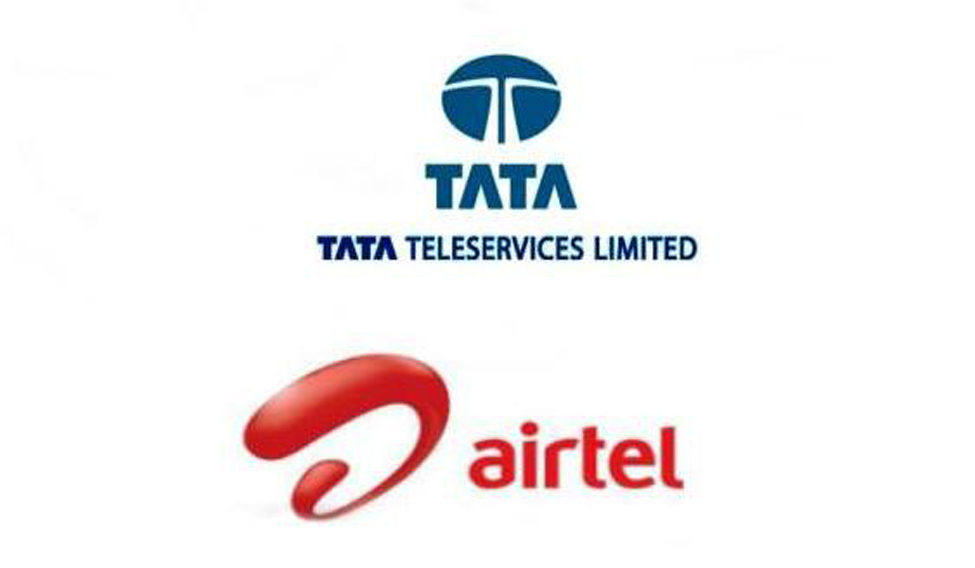In a big move since N Chandrasekaran took over as the chairman, the Tata Group has announced plans to sell the consumer mobile business of ailing Tata Teleservices to Bharti Airtel, the country's largest telecom company.
The remaining business of Tata Teleservices will also be broken up, with the company in initial stages of exploring the merger of enterprise business with Tata Communications and the retail fixed line and broadband business with Tata Sky.
The merger with Bharti Airtel is being done on a debt-free, cash-free basis, except for Airtel taking a small portion of the unpaid spectrum liability of Tata's towards the department of telecommunications.
As a part of the deal, Airtel will absorb Tata Teleservices consumer mobile business operations across 19 circles (17 are managed by Tata Teleservices and two by the subsidiary Tata Teleservices Maharashtra).
The proposed merger will include transfer of all the customers (around 40 million) and assets of Tata's consumer mobile business to Airtel and the latter will also strengthen its spectrum footprint with the addition of 178.5 MHz spectrum across various bands.
Employees of Tata Teleservices will be demerged on the lines of the two businesses – consumer mobile business and enterprise, fixed line and broadband business.
“We believe today's agreement is the best and most optimal solution for the Tata Group and its stakeholders,” said Chandrasekaran.
He further added that, “Finding the right home for our longstanding customers and our employees has been the priority for us. We have evaluated multiple options and are pleased to have this agreement with Bharti.”
The deal will also give Airtel an “indefeasible” right to use part of the existing fibre network of Tata Teleservices. The two companies will also work together to further explore other mutual areas of cooperation.
The merger comes in the backdrop of a wave of consolidation in the telecom industry. Several companies were already struggling, but consolidation gathered steam particularly in the wake of the aggressive entry of Reliance Jio. Jio's offering of free voice calls and cheap data, led to incumbents also announcing competitive plans. But, that has come at the cost rising pressure on earnings.
In the year-ending March 2017, Tata Teleservices reported a loss of Rs 4,617 crore.
“This is a significant development towards further consolidation in the Indian mobile industry and reinforces our commitment to lead India’s digital revolution by offering world-class and affordable telecom services through a robust technology and solid spectrum portfolio,” said Sunil Bharti Mittal, chairman, Bharti Airtel.
On completion, the proposed acquisition will undergo seamless integration, both on the customer as well as the network side, and further strengthen our market position in several key circles, Mittal added.
Earlier this year, Airtel acquired Norwegian telecom company Telenor's Indian wireless business. Elsewhere, Vodafone and Kumar Mangalam Birla-owned Idea Cellular are also in talks to merge their business.
Anil Ambani-owned Reliance Communications was in talks to merge its wireless business with Aircel, but the proposed deal was called off earlier this month. RCom, however, is expected to complete the merger of Sistema Shyam soon.
Analysts have long said that a consolidation in the telecom sector was imminent as smaller players would find it increasingly difficult to survive in a highly competitive market, and like in many developed markets, only top three or four companies will dominate over the longer term.
Foreign brokerage CLSA had noted recently that Tata Teleservices, RCom, Aircel, Telenor and Sistema combined had only 20 per cent of telecom sector's revenues. With the potential exit of some of these players, the industry was likely to transition to a four player market, where Airtel, merged Vodafone-Idea and Jio together could account for over 90 per cent of industry revenue, it had said.
Over time, the consolidation in the sector is expected to help the larger telecom companies improve their profits.






